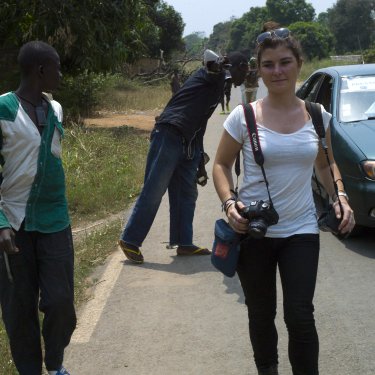Bangui judicial authorities lose French journalist’s murder file

Four years after the young French photojournalist Camille Lepage was shot dead in an ambush in the Central African Republic’s western Bouar region on 12 May 2014, judicial problems in Bangui continue to hold up the investigation into her murder.
“Closing this case is out the question until we are satisfied that everything that could be done has been done,” said Vincent Fillola, the Lepage family’s legal adviser, who has just returned from a visit to Bangui. Aged 26, Lepage was murdered while travelling with one of the “anti-balaka” militias that fought the Séléka rebels during the 2012-2014 civil war in the CAR. Her killers have still not been identified and much remains to be done to advance the investigation.
According to the information obtained by RSF, Fillola encountered an unexpected problem in Bangui: the Lepage murder case file has disappeared. Continuing political instability in the CAR, which has resulted in many judges being moved from one position to another, could be to blame. The judicial authorities insist they are doing everything possible to find the file, but its disappearance forced the judges to postpone the trial that was initially scheduled for January 2018.
Several hypotheses have been developed about the circumstances of the ambush and possible suspects have been named, but no investigation has been carried out at the scene of the murder and no crime reenactment has been conducted, although this is obligatory in murder cases. Carrying out an investigation at the place where the murder took place would have been very difficult four years ago because of the security situation prevailing at the time, but it would be possible now, Fillola said in an interview for Reporters Without Borders (RSF). “Police investigators and investigating judges say that current conditions would allow a visit to the location, with the support of MINUSCA [the UN peacekeeping mission in the CAR] and the French judicial services,” he said. “Everyone is calling for a field investigation.”
“We count on the judicial authorities to do every possible to locate the Camille Lepage murder file,” RSF secretary-general Christophe Deloire said. “And since the security situation now allows it, it is incomprehensible that the investigators have not yet been able to carry out their investigation in the field, including a reenactment of the crime using forensic methods, which is essential. It is high time to complete this investigation, which has dragged on for too long. The responsibility and credibility of the CAR authorities is at stake. Everything must be done to ensure that this murder is not left unpunished.”
Despite the problems in Bangui, Camille Lepage’s mother, Maryvonne Lepage, is determined to press on to the end. “Even if we cannot put a name to the person whose finger was on the trigger, it is essential that we at least identify the group that carried out the attack.” As well as establishing the truth about her daughter’s death, she is also aware of the need to press on for the sake of all the other reporters and photojournalists killed or missing in the field. “If we pursue this to the end, it can help all the other families to press on with their own investigations, or it can help to put other forgotten cases back on the agenda.”
The Lepage murder is far from being the only one of a French journalist that is still unresolved after years. The investigation into the murders of Radio France Internationale journalists Ghislaine Dupont and Claude Verlon in northeastern Mali in 2013 has yet to be concluded. And the disappearance of Guy-André Kieffer, a journalist with French and Canadian dual nationality who disappeared in Côte d'Ivoire in 2004 while investigating shady practices in the cocoa trade, is unsolved after 14 years.
According to the latest RSF tally, 1,035 journalists have been killed in connection with their work in the past 15 years, 65 of them in 2017.


